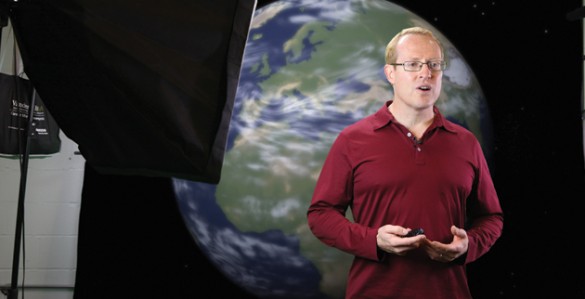Vanderbilt University and the University of Maryland have teamed up to introduce a new approach to massive open online courses, or MOOCs – a two-part, sequenced course offered through the digital learning platform Coursera.
The joint MOOC begins this month with the Maryland course, “Programming Handheld Systems with Android.” It will continue until March with the Vanderbilt course, “Pattern-Oriented Software Architecture.” Students will learn how to develop a mobile app and how to connect it to a computing cloud. Each segment of the course will be 8 to 10 weeks long. Like all Coursera classes, the sequenced courses are free and open to all.
The project, which is the first multi-institutional, two-part MOOC, demonstrates a collaboration that would have been unmanageable in the past, the organizers say.
“Creating such an opportunity for Vanderbilt and University of Maryland students alone would be incredibly complex in a traditional environment. With the MOOC platform, not only is it possible, it will now be available to learners globally,” Douglas Schmidt, professor of computer science and of computer engineering at Vanderbilt said. Schmidt and Jules White, assistant professor of electrical engineering and computer science, will teach the Vanderbilt course. The Maryland portion of the course will be taught by Professor of Computer Science Adam Porter.
“This trans-institutional and interdisciplinary MOOC sequence will provide an exemplar of how intentionally coordinated MOOCs can create learning communities that cut across traditional institutional and disciplinary boundaries,” Schmidt continued.
“The demand for application development skills is growing at a breathtaking pace,” said Porter. “These skills, however, are multi-faceted, requiring students to master computer science and engineering principles, to learn the details of specific mobile application platforms and to design artistic and engaging user interfaces that respond to how, where and why handheld applications are used. Although Doug, Jules, and I have collaborated on research for decades, collaborating on education was just too complicated. Digital learning has changed all that.”
A set of programming assignments will help integrate the material covered in both courses in the sequenced MOOCs. Students taking Porter’s course will build the user-facing portions of a mobile app using server modules provided by Schmidt and White. Students in Schmidt and White’s course will build the server portions of the app using client modules that will be provided by Porter. The end result will be a complete app that demonstrates the pattern-oriented integration of mobile devices with cloud computing platforms.
“This sequence of courses was intentionally designed to complement each other,” explained Schmidt. “The programming assignments and the course project for both courses will be coordinated. Students who take all the courses in this sequence will gain a much more detailed, end-to-end understanding of handheld systems, their applications and services, as well as their integration into the cloud.”
The app the students develop will support global collection and analysis of data in a range of domains, which other MOOC instructors could use as part of their future offerings.
Vanderbilt and Maryland each joined Coursera in September 2013. Schmidt’s course was among Vanderbilt’s initial offerings and had more than 30,000 registered students.
In May 2013, Vanderbilt Chancellor Nicholas S. Zeppos announced the launch of the Vanderbilt Institute for Digital Learning to manage, explore and study the university’s development and implementation of MOOCs and other digital learning platforms. VIDL is led by Douglas Fisher, associate professor of computer science and of computer engineering.
Visit the Vanderbilt Digital Learning website to learn more about the university’s digital learning initiatives. Visit the Coursera website to learn more about Coursera and to register for classes.
